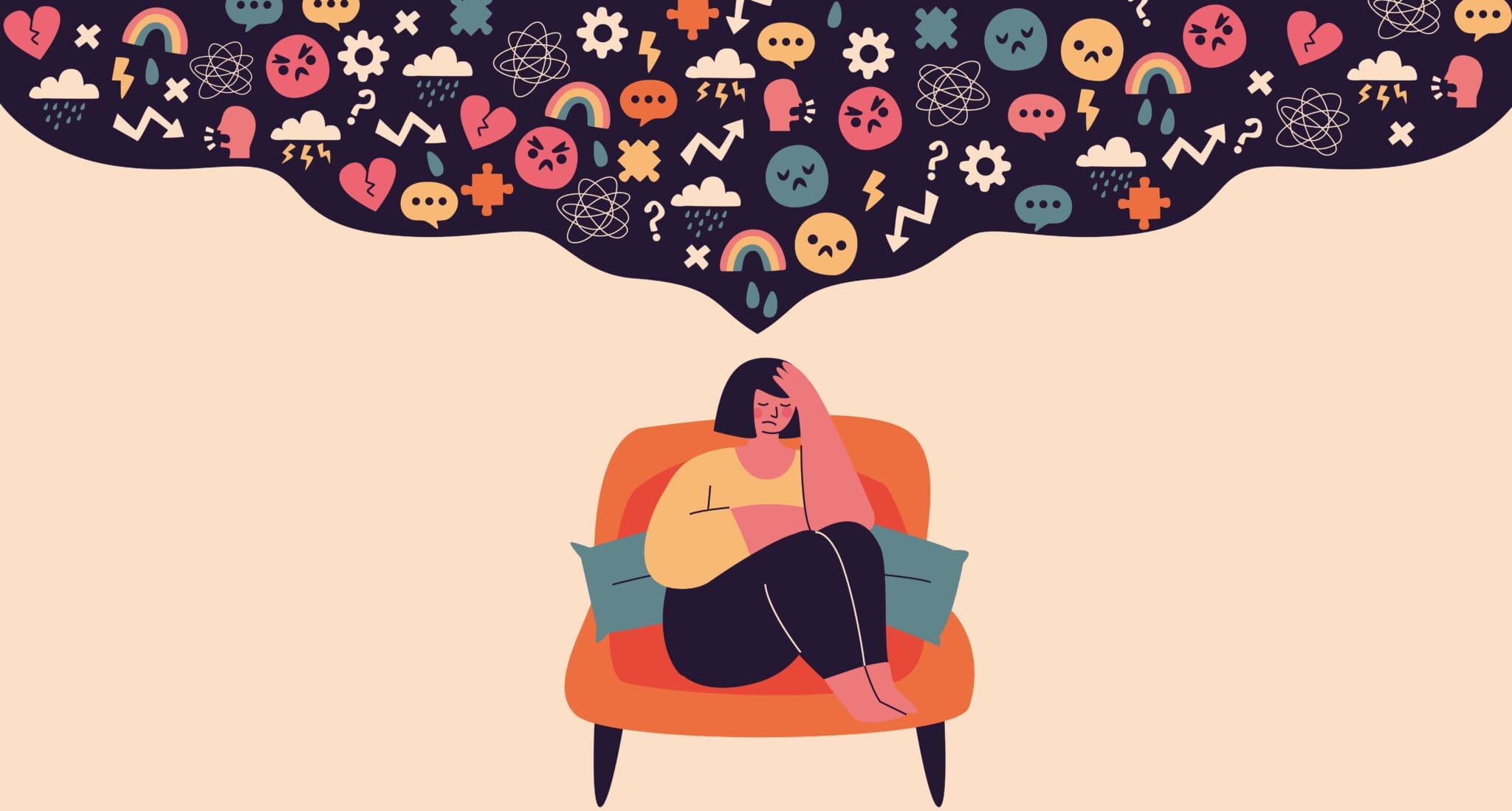
Anxiety: Chemical Imbalance and Other Contributing Factors
Read Time:
9.4 minutes
Share This:
Is Anxiety Really a Chemical Imbalance in the Brain?
Information from the Anxiety & Depression Association of America tells us that anxiety affects 40 million adults in the United States every year. Between 2007 and 2012, anxiety disorders in children and teens increased 20 percent globally and affected 31.9 percent of adolescents between 13 and 18 years in 2021, according to the World Health Organization.
That’s alarming.
What’s causing all this anxiety in our kids and adults?
Let’s look at what the science says.
Understanding Anxiety Disorders
Anxiety disorders are a prevalent type of mental health condition that can significantly impair daily functioning and quality of life. They are characterized by excessive and persistent fear and dread responses to certain things and situations.
Generalized anxiety disorder (GAD) and social anxiety disorder (SAD) are influenced by genetic and neurobiological factors, with research highlighting the role of genetic variants and brain structures like the amygdala and prefrontal cortex in these disorders.
Research suggests that women are approximately twice as likely as men to experience an anxiety disorder, and these conditions can affect children, adolescents, and adults. Effective treatments are available, emphasizing the importance of early detection and diagnosis to tailor the right combination of treatments to meet specific needs.
What is an Anxiety Disorder?
An anxiety disorder is a mental health condition involving an excessive and persistent fear and dread response to certain things and situations. Unlike normal anxiety, which is a natural response to situations like work problems, interviews, tests, or important decisions, anxiety disorders can be debilitating if left untreated. These disorders can disrupt daily life and are often linked to imbalances in brain chemicals, such as serotonin and dopamine, which play a crucial role in regulating mood, appetite, and sleep. Treatment often involves a combination of medication, psychotherapy, and lifestyle changes to manage symptoms effectively.
You Have Anxiety Because You Have a Complex Brain
Anxiety is actually a highly evolved capability of your big, complex brain. Your brain’s prefrontal cortex, behind your forehead, developed the ability to problem-solve and, the limbic system, the fear center, became an expert trend-spotter, idea-connector, and pattern-finder.
When something threatening or painful happens, your limbic system analyzes everything that led up to it and tries to spot a pattern — to avoid it in the future. To do this, the limbic system attempts to connect the “bad thing” to something in your brain’s memory. When your brain thinks it might encounter a “bad thing” again, anxiety results as your brain attempts to problem-solve how to avoid the potential future threat.
Initially, anxiety is just your brain doing its job trying to keep you safe, and it’s usually connected to something specific. Over time and with repetition, anxiety can become a habitual brain pattern. Through associative learning from experience, your brain learns to connect thoughts and events with fears and negative feelings.
The associated items, which may have initially had nothing to do with each other, become connected in your neural web, and your limbic system activates the brain’s fear response whenever you think about them. Panic disorder (PD) is a more severe form of anxiety where biological underpinnings, genetic contributions, and treatment options such as medication, psychotherapy, and self-help strategies play a crucial role.
When this happens, you can become unable to shift gears mentally, and you may get stuck on a loop of thoughts, feelings, or bodily sensations that cause or exacerbate feelings of anxiety. After a while, instead of stressing about a particular issue, anxiety can become a near constant feeling and brain state accompanied by the corresponding chemicals, brainwaves, and symptoms.
This How Anxiety Affects Your Body
Anxiety can have a significant impact on the body, causing physical symptoms such as a pounding heart, sweating, and trembling. It can also affect the digestive system, causing nausea, abdominal pain, and changes in appetite. Anxiety can also lead to sleep disturbances, fatigue, and difficulty concentrating. In severe cases, anxiety can lead to panic attacks, which can be debilitating and disrupt daily life.
How Anxiety Affects Your Body’s Physical Symptoms
Because anxiety triggers the fear/stress response, your brain and body release stress hormones. While the stress response does serve a useful purpose, it was meant to be activated infrequently to help you survive infrequent life or death situations. Being in a continual state of stress long-term has negative consequences for your body and harms your physical brain and its functioning.
Chronic stress makes you forgetful and emotional, increases your susceptibility to anxiety, depression, Alzheimer’s, and many other mental illnesses, and it physically damages your brain.
Mental illness is often linked to chemical imbalances in neurotransmitter levels, but attributing it solely to chemistry oversimplifies the issue.
In the brain, anxiety usually shows up as decreased alpha waves, increased beta waves, and low delta and theta waves. In the body, when the brain sounds the stress alarm, your autonomic nervous system produces the classic bodily fear responses: thumping heart, skyrocketing blood pressure, and rapid breathing. Your adrenal glands pump out adrenaline, glucose is released into your bloodstream, and cortisol floods your system.
While a boost of these chemicals would definitely help you outrun or fight a predator, it’s not helpful to have a surplus of these substances coursing through your veins regularly. Other chemicals in your body that may get involved in anxiety include serotonin, dopamine, norepinephrine, and gamma-aminobutyric acid (GABA).
So, chemicals contribute to keeping anxiety going in your brain and body, but that’s only one part of the story.

The Answer to Decreasing Anxiety Is In Your Brain
While you feel the effects of anxiety all over your body, it begins in your brain and can end there. The answer to easing and reversing anxiety is to turn down your brain’s stress response and strengthen your brain’s relaxation response.
Technically, your brain needs to increase its slow wave activity and engage the parasympathetic nervous system so your mind and body can become less aroused and reactive.
Mental Health and Chemical Imbalances
Mental health conditions, including anxiety disorders, are often linked to chemical imbalances in the brain. Healthcare professionals diagnose mental health conditions through psychological evaluations based on established guidelines, such as the DSM-5, to provide accurate diagnoses and tailored treatment plans.
There are many ways you can encourage your brain to increase the production of alpha waves and calm anxiety naturally. Neurofeedback is one of those. Neurofeedback is a way of improving anxiety at the source, in your brain, permanently and without medication.
Research shows that neurofeedback successfully trains your brain to decrease the activation of the amygdala so that it doesn’t initiate the stress response as often. And it increases the connectivity and ability of your intelligent brain, the prefrontal cortex, to calm and regulate your brain and body.
Relationship Between Mental Disorders and Chemical Imbalances
There is a complex relationship between mental disorders and chemical imbalances. While chemical imbalances can contribute to the development of mental health conditions, they are not the sole cause. Mental health conditions, including anxiety disorders, are often the result of a combination of genetic, environmental, and psychological factors. Treatment for mental health conditions often involves a combination of medication, psychotherapy, and lifestyle changes.
Chemical imbalances can affect the brain’s ability to regulate mood, appetite, and sleep, leading to symptoms of anxiety disorders. Selective serotonin reuptake inhibitors (SSRIs), a type of antidepressant medication, can help to regulate serotonin levels in the brain, reducing symptoms of anxiety.
However, the chemical imbalance theory is not a proven cause of any specific mental health condition, and more research is needed to understand the relationship between chemical imbalances and mental health conditions.
In addition to chemical imbalances, other factors can contribute to the development of anxiety disorders, including genetic predisposition, environmental factors, and psychological influences. A comprehensive treatment plan for anxiety disorders often involves a combination of medication, psychotherapy, and self-help strategies.
Physical symptoms of anxiety disorders can be debilitating and disrupt daily life. Major depressive disorder, a type of mental health condition, can also be associated with anxiety disorders. Imbalances in brain chemicals, such as serotonin and dopamine, can contribute to symptoms of anxiety disorders.
Mental health disorders, including anxiety disorders, can have a significant impact on daily life and quality of life. Effective treatments are available, and early detection and diagnosis are crucial to tailoring the right combination of treatments to meet specific needs.
Separation anxiety disorder, a type of anxiety disorder, can affect children and adolescents, causing excessive fear and anxiety when separated from a parent or caregiver. Diagnosing mental health conditions, including anxiety disorders, often involves a combination of symptoms, medical history, and physical examination.
Mental illnesses, including anxiety disorders, can be complex and multifaceted, involving a combination of genetic, environmental, and psychological factors. Brain chemicals, such as serotonin and dopamine, play a crucial role in regulating mood, appetite, and sleep, and imbalances in these chemicals can contribute to symptoms of anxiety disorders.
Other mental health conditions, including mood and anxiety disorders, can be associated with anxiety disorders. Antidepressant medications, such as SSRIs, can help to regulate serotonin levels in the brain, reducing symptoms of anxiety. However, the chemical imbalance theory is not a proven cause of any specific mental health condition, and more research is needed to understand the relationship between chemical imbalances and mental health conditions.
Imbalances in the brain, including imbalances in neurotransmitters, can contribute to symptoms of anxiety disorders. Mental disorders, including anxiety disorders, can have a significant impact on daily life and quality of life. Effective treatments are available, and early detection and diagnosis are crucial to tailoring the right combination of treatments to meet specific needs.
How Does Neurofeedback Ease Anxiety?
Neurofeedback is a non-invasive therapy, where a person learns to influence their body’s autonomic nervous system at a subconscious level to permanently alter their brainwaves. Neurofeedback has been around since the 1950s and is a reputable, scientifically proven modality administered by trained practitioners.
In a training session, EEG sensors are placed on the scalp, which read the electrical activity of the brain. Brainwaves are monitored by a computer which gives real-time feedback to the person training in the form of an auditory or visual reward, like music or a video game. With consistent repetition, the brain learns subconsciously, through operant conditioning, and makes permanent physiological changes to function more optimally. The altered operation continues after the training.
Neurofeedback can calm your brain’s stress response and teach it to increase the production of calming brain waves permanently. Calm and less anxious can become the default state for your mind and body.
Conclusion
As you may know all too well, anxiety can hijack your mind and show up as physical symptoms, including digestive disorders, memory loss, headaches, chest pain, numbness, dizziness, and more. Neurofeedback successfully decreases the symptoms of anxiety and many other conditions, including depression, autism, ADD and ADHD, brain injuries, OCD, stroke recovery, PTSD, addictions, seizure disorders, migraines, chronic pain, and more.
At Grey Matters of Carmel, we are passionate about helping people live their best lives. Give us a call at (317) 215-7208 or send us a message today to find out how we can help you.
Photo Credit:
Top image by pikisuperstar on Freepik
Second photo by Vitalii Khodzinskyi on Unsplash



